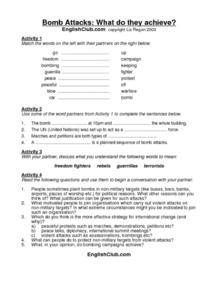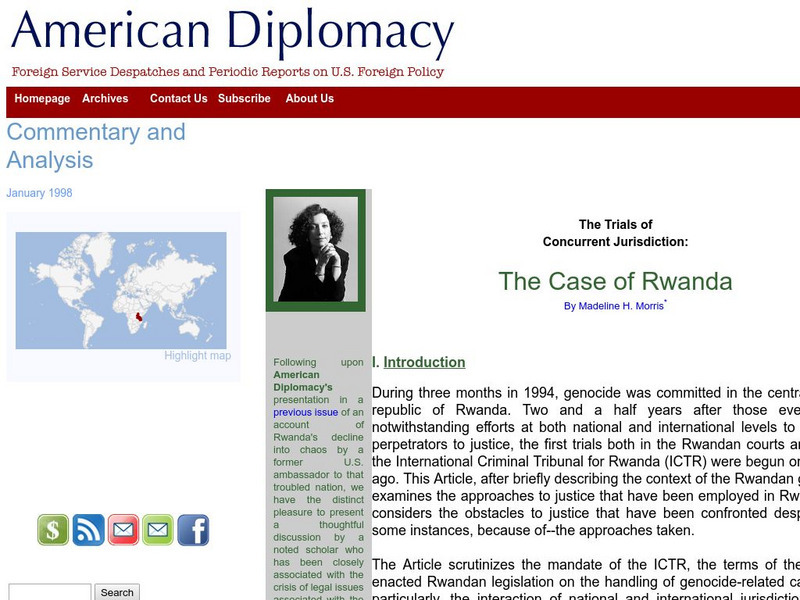Curated OER
What George Bush Got Right
In this George W. Bush worksheet, students read a 4-page article about the diplomatic actions of the president and then complete the provided graphic organizer.
Curated OER
Pacifism vs. Patriotism in the 1920s
Students examine the philosophy of different organizations after World War I. They discover the impact of the "Red Scare" and how this affected peace organizations of the time.
Curated OER
Bridging the gap between the U.S. and Cuba
Eleventh graders examine the events that led to the strained relationship between Cuba and the United States. In this US History lesson, 11th graders create an illustrated timeline of Cuba-U.S. relations. Students write an essay...
Foreign Policy Research Institute
Understanding the Koreas
Though this resource was designed in 2005, US tension with North Korea remains a relevant topic for exploration and understanding. Unfortunately, this lecture and reading-based lesson plan is unlikely to engage the class. The end product...
Curated OER
The Imperial Republic: 1865-1914 (5)
In this online interactive social studies worksheet, students answer 14 matching questions regarding the Imperial Republic. Students may submit their answers to be scored.
Curated OER
The Struggle to End Apartheid
Learners research the occurence, history and politics of apartheid in South Africa. They study Canada's involvement through sanctions and other pressures on the apartheid movement.
Curated OER
Freedom from Oppression
Students investigate instances of genocide and role play as reporters writing news stories and editorials.
Curated OER
The Crisis in Darfur
Students examine the history and current humanitarian crisis occurring in the Darfur region of Sudan. In small groups, they conduct Internet research, answer discussion questions, and present their findings to the class.
Curated OER
History: I'm Watching You 24/7
Students examine the growth of authoritarian societies. Focusing on North Korea, they watch video clips looking for examples of totalitarianism and identify the problems there. They write letters to the editors of local newspapers...
Curated OER
Bomb Attacks: What Do They Achieve?
In this bomb attacks and what do they achieve instructional activity, students, with a partner, examine, analyze, discuss and complete a variety of activities associated with bombs and the effects of them worldwide.
Curated OER
Reenacting the Treaty of Versailles
High schoolers examine how provisions in the Treaty of Versailles contributed to events in WWII. They participate in a debate, researching their position, then presenting their national position orally to the class.
Curated OER
Declaration of Power
Students examine the Korean nuclear escalation. In this current events lesson, students explore the nuclear arms race in Korea and the science that explains nuclear weapons.
iCivics
I Civics: International Affairs
Students learn about the complex interactions that exist in our globalized world. They examine the evolution of diplomacy and international interdependence by looking at recent and historical global events. It includes games and...
University of North Carolina
American Diplomacy: Rwanda, Trials of Concurrent Jurisdiction
While the focus of this article is on the genocide trials in Rwanda and before the International Tribunal, there is information on the concept of concurrent jurisdiction as it applies to this specific situation. (Published January 1998)
Sophia Learning
Sophia: Multi Track Diplomacy: Lesson 3
At the end of this tutorial, the learner will understand the concept of multi-track diplomacy as a means of international conflict resolution. It is 3 of 4 in the series titled "Multi-Track Diplomacy."
US Department of State
Office of the Historian: u.s. Diplomacy and Yellow Journalism
"You furnish the pictures, I'll provide the war!" was a quote said by William Randolph Hearst in the time leading up to the Spanish-American War. Learn how yellow journalism led to international conflict and was one cause of the...
Mount Holyoke College
International Relations: William Howard Taft: Dollar Diplomacy
President Taft's 1912 comments on his foreign policy that substituted "dollars for bullets."
Mount Holyoke College
International Relations: Wilson's Address to Congress: The Tampico Affair
Read the full text of Wilson's 1914 address to Congress regarding the Tampico Affair in Mexico.
US Department of State
U.s. Dept of State: Diplomacy in Action: Patterns of Global Terrorism
This resource gives a summary of the number of terrorist attacks that occurred and where they are happening, along with charts and tables.
Khan Academy
Khan Academy: Us History: 1890 1945: The United Nations
Read how the United Nations emerged after World War II as an international peacekeeping organization.
Khan Academy
Khan Academy: Us History: 1890 1945: The League of Nations
After World War I, US President Woodrow Wilson helped to build an international peacekeeping organization.
University of Pennsylvania
United Nations Scholars' Workstation
Very scholarly site that provides a starting point for research into the United Nations. The best information lies under research tools and research approaches.
Sam Houston State University
Shsu: The Warsaw Pact
Contains a wealth of information about the Warsaw Pact. Includes information about the Soviet Alliance System, the organization of East European National units, the development of Socialist Armies in Eastern Europe, East-West diplomacy...
US National Archives
Docsteach: Apollo Soyuz: Space Age Detente
In July 1975, the first joint Soviet-American spacecraft docking took place. In this activity, students will analyze the way that government officials in both the United States and the Soviet Union valued space exploration for more than...
























